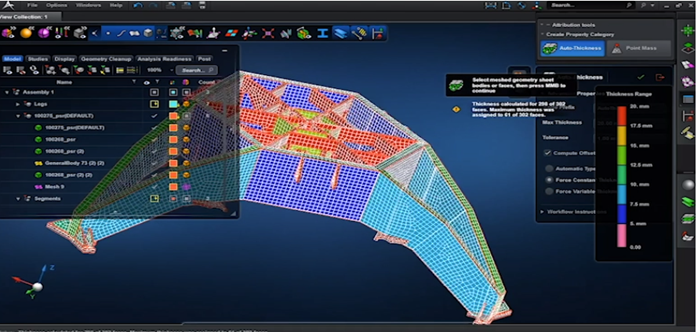Two quality European multinational companies trading at attractive valuations
I recently travelled through Europe and continue be impressed by the globally leading industrial companies scattered around central and northern Europe. We have been adding high quality European industrial and diversified financial companies to the portfolio as companies that we have been watching for years are reaching compelling valuations. Europe now trades at a 35% price to earnings discount to the United States, an all-time low. We have 30% of our portfolio in Europe, predominantly in the United Kingdom, France, Germany and Sweden.
Hexagon (STO: HEXA)
Hexagon is a global multinational company that combines sensors, software and autonomous technologies to automate and improve processes and workflows. Their products and services are used to make factories, farms, mines and industrial facilities more productive and efficient. The company was established in 1975 in Sweden and has grown organically and through acquisitions since then. The growth has been impressive and resilient to economic downturns. Over the past decade earnings per share has quadrupled as the company has generated consistent double-digit earnings growth. Their technology is now used in 95% of all car manufacturing, 75% of all smartphones and 90% of all airplanes.
The company’s revenues are evenly split between North America, Europe and Asia with 60% of revenues derived from software and services, providing consistent revenue and earnings growth. They provide geospatial enterprise solutions, with their professional surveying technology having been developed over the past 50 years and is a leader in infrastructure and construction markets. They sell sensors as well as software to create 3D maps and models, which are used for decision making in industries such as surveying, construction, public safety, mining and agriculture. The company is also a leader in in metrology solutions combining software and sensors for fast and accurate measurements. Companies use this software to create a 3D replica of their products to ensure that what they are manufacturing is exactly the same as what they designed. They have a broad software portfolio encompassing computer aided design (CAD), computer-aided manufacturing and computer-aided engineering platforms which assist in managing industrial plants and processing facilities. Hexagon and Aviva are the global leaders in asset life cycle intelligence and CAD design for large industrial facilities.

Hexagon’s autonomy and positioning business represents 10% of revenues and is growing quickly. They recently won a $100 million order from Australia’s Mineral Resources to automate the transport of resources from their mines to the port. Traditionally mining companies would build a railway to the port but with Hexagon’s autonomous system you only need one person driving the front truck and you then can have a series of autonomous trucks following. Eventually you will not even need the first driver. They are selling a system which includes their geo-systems mapping technology, GPS vehicles with sensors for collision avoidance and software to steer the trucks.
Melker Schorling (STO: MELK), controls the company with over 20% of the shares and 40% of the voting rights. Together with President and CEO Ola Rollen, they built the company to what it is over the past 25 years. We expect the experienced management team and board to continue to deliver for shareholders and are excited to have the opportunity to start acquiring shares in this quality company at an attractive entry price.
MTU (LSE: MTU)
MTU is one of the few global manufacturers of aviation engines and components. It has its origins from BMW in 1913 and was created in 1969 when BMW’s aviation engine business was merged with M.A.N.’s turbine engine activities and Damler-Benz’s heavy duty diesel engine activities. Initially the company developed a joint venture company with Rolls Royce and Fiat to develop an engine program for combat aircraft for defence forces. In the 1970s MTU entered the commercial engine aircraft market, joining a consortium with General Electric to manufacture engines for Airbus. Over the years MTU has also built out leading maintenance, repair and overhaul (MRO) services for aviation engines. MTU has collaborated with the major global engine manufacturers to form consortiums in developing a variety of engines. In 1991 they formed a strategic alliance with Pratt and Whitney which is still in existence today.

MTU’s core technology is its high-speed low-pressure turbine. Its aerodynamic optimisation enables it to achieve higher efficiencies than competing turbines. They focus on the narrow body aircraft market and are part of a number of engine consortiums. They have an 18% share of the GTF engine with Pratt and Whitney holding the largest stake in the consortium. The GTF engine has a 40% share of airbus aircraft, higher than its major competitor, the Leap engine. Their only major competitor is CFM International, which is a JV between GE and Safran, that produces the LEAP engine.
What sets the GTF propulsion system apart is that it features a reduction gearbox between the fan and low-pressure shaft on which the low-pressure compressor and low-pressure turbine that drives the fan are seated. This increases efficiency and reduces carbon dioxide emissions by 16 percent. By 2030, CO2 emission will be cut by approx. 25 percent and the noise level further reduced as a result of continued optimisation. Its fuel efficiency advantage is what makes it an attractive choice for aircraft manufacturers like Airbus (EPA: AIR).
The sale of engines is a multi-year process, whereby the engine manufacturers generate most of their profits after a period of time during the maintenance and service phase of the fleet. MTU generates 800 million euro in earnings before interest and tax with the GTF engine only generating about 100 million of this. Their V2500 engine is their most profitable engine at the moment. The consortium that MTU is part of that produces the V2500 engine first started selling these engines in 1989. Over 7600 of these engines were delivered over the next 30 years and now the consortium generates significant profits from maintaining and servicing these engines.
MTU has recently seen its stock fall over 20% due to Pratt and Whitney’s decision to service and check 700 aircraft with GTF engines produced between 2015-2021. There is concern about a faulty component, but not one of MTU’s parts. Pratt and Whitney announced a $6-$7 billion provision as a cost to ground these planes and check the engines. Whilst MTU’s share of the consortium is only 18%, its market capitalisation has fallen more than its share of the costs. Further, after meeting Airbus in Europe, it is clear to us that Airbus has no intention of cancelling its current intake of GTF engines for 2023 and 2024. Airbus can’t keep up with the current demand for narrow body planes from airlines. They also are confident that there is nothing wrong with the current GTF engines being produced.
I have been following and meeting the engine manufacturers for over a decade and have visited MTU’s manufacturing centre just outside of Munich. It is very rare to be able to buy such a high-quality business at such an attractive valuation and we have been taking advantage of the fear in the market to accumulate shares. I also met with MTU management in Munich in September, and they seem confident that the estimated costs to inspect the old engines are conservative.
2 topics

